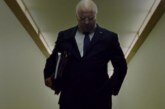Stuck in its Tracks
Murder on the Orient Express is a remake of the 1974 film based on the 1934 novel (which also was a 2001 TV film and a 2010 TV episode). The film already has a passionate Agatha Christie fan-base, yet the uneven tone and dull investigation leaves this release in the middle of the tracks. Kenneth Branagh definitely tinkers with his own direction style to perfectly capture the legendary detective Hercule Poirot. Starring in his own directed feature allows Branagh to shine. Unfortunately, the varied supporting cast remain uninteresting and similar. While the connected thread is important to the plot of the story, the lack of uniqueness contrasts too shockingly with the eccentric Poirot.
In 1930s Europe, famed detective Hercule Poirot boards the legendary Orient Express for a small break in between cases. While on board, he meets an interesting assortment of characters. One fellow passenger, Edward Ratchett (Johnny Depp), implores Mr. Poirot to assist him while on the train as he fears for his well-being, though Poirot respectfully declines. The next morning, Ratchett is found stabbed to death. With the train halted due to an avalanche derailing the engine, and with the evidence and suspects piling up, Poirot finds himself diving into a case that could be his biggest yet.
Branagh finds a way to twist this old narrative, while still telling relatively the same exact story. Rather than merely have the camera portray the events of the film, the lens is a character itself, showing viewers only part of the affair. At one point Branagh hangs the camera from the ceiling for an elongated, overhead perspective view. This occurs at a scene where the audience is clamoring to see every minute detail, yet Branagh purposefully keeps the camera afar. I believe this tactic is very successful in keeping the audience aloof in the mystery and dependent on Poirot/Branagh. However, the dialogue desperately needed to be modernized for a new audience. Many of the interviews of possible suspects fail to leave a lasting impact on viewers. The supporting cast is made up of a who’s who of famous actors and actresses, yet this varied cast never fully takes the film in new directions.
In a personal surprise, Johnny Depp was very compelling in his limited screen time. It is very important for this character to have an impact on the viewers in some way. Depp embraces the moral complexity of this character which will be discussed throughout the film. Daisy Ridley and Josh Gad are also strong in their supporting roles. Gad in particular is given a very dramatic monologue enhanced by Branagh curious camera angle. This scene culminates in a quick cut somewhat giving agency to the audience to decide what weight to give Gad’s alibi.
While the middle investigation storyline is a slog, the end is tense (even if somewhat manufactured) and the ending posits a paradoxical problem that should leave viewers with an ethical dilemma to ponder. If the franchise continues with future installments, a mix of episodic stories may be a better choice for these adaptations. The beginning of the movie starts off to a fantastic pace that expertly introduces Poirot as an astounding detective.
Overall, fans of Agatha Christie will likely enjoy this murder mystery but general audiences may struggle to reach the ending.
Score: 6.2/10







